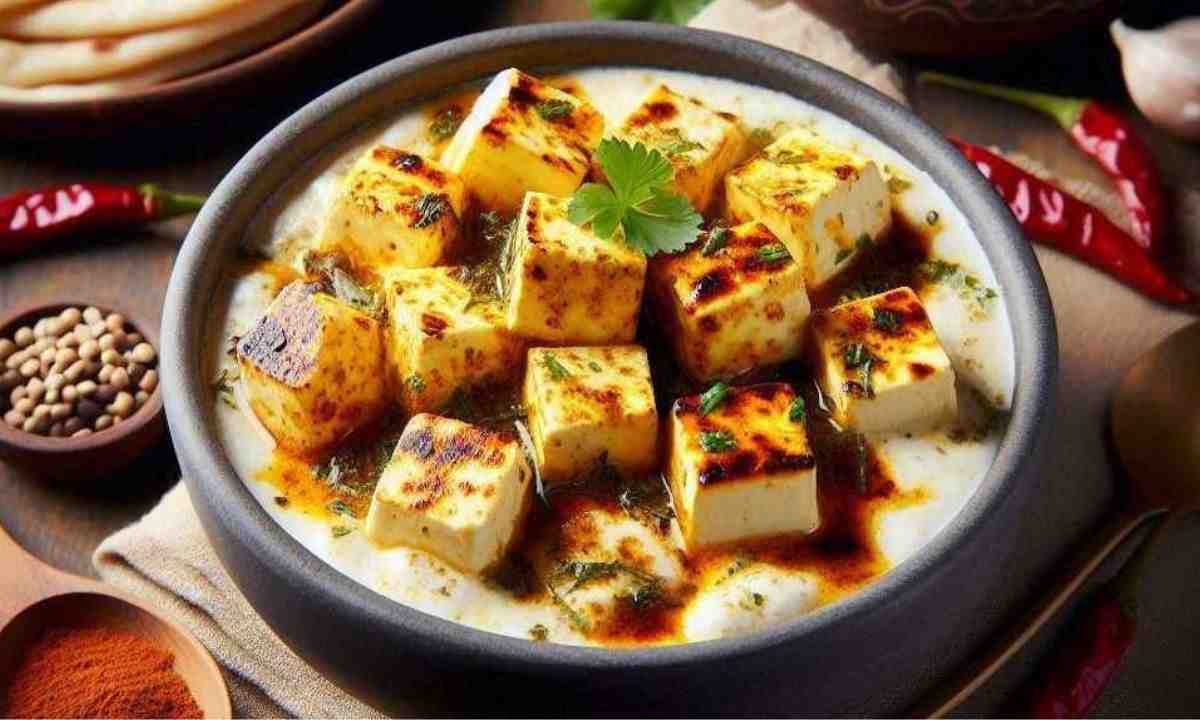Have you ever thought Does Paneer Have Lactose? We know that Paneer is a favorite ingredient in many households, especially in Indian cuisine.
Known for its versatility and rich texture, it is used in a wide range of dishes, from curries to snacks.
But if you are lactose intolerant or following a dairy-free diet, you may be wondering if paneer contains lactose?
This article explains in detail the lactose present in paneer, how it is made, and whether it is safe for lactose-intolerant individuals to consume.
Does Paneer Have Lactose?
The short answer is YES, paneer contains lactose. Since paneer is made from milk, it retains the lactose present in the milk it is made from.
However, the amount of lactose in paneer is usually lower than in other dairy products such as milk or cheese.
The process of making paneer involves heating milk and adding an acidic agent to curdle it. During this process, most of the liquid whey, which contains the lactose, is drained away.
However, not all of the lactose is drained away, and a small amount of it remains in the solid curds.
Comparison with Other Dairy Products:
| Dairy Product | Lactose Content | Notes |
|---|---|---|
| Milk | High | Contains significant lactose. |
| Cheese | Varies (Low in aged cheeses) | Aged cheeses may have lower lactose levels. |
| Paneer | Low to moderate | It contains less lactose than milk but more than aged cheeses. |
| Yogurt | Moderate (depends on fermentation) | Fermented yogurt can have less lactose due to bacterial activity. |
Although paneer contains some lactose, it generally has less than fresh milk.
Also Read: How To Keep Paneer Soft In Gravy?
Lactose Intolerance and Paneer
Lactose intolerance is the inability to properly digest lactose due to a lack of the enzyme lactase. This condition affects millions of people worldwide.
While cheese does contain some lactose, it is often better tolerated by people with lactose intolerance than other dairy products.
- Low lactose content: Since whey is removed during the process, cheese contains less lactose.
- Lactase activity: The relatively low lactose content of cheese makes it easier for people with mild to moderate lactose intolerance to consume it without any significant discomfort.
However, the amount of cheese someone can eat without any symptoms depends on the person’s level of tolerance to lactose.
Is Paneer Safe for Lactose Intolerance?
For many people with lactose intolerance, enjoying paneer in moderation is usually safe unless their intolerance is particularly severe.
Paneer contains significantly less lactose than milk, thanks to the fermentation process, which reduces the lactose content and makes paneer easier for most to digest.
Hard paneer like cheddar and Parmesan are especially low in lactose, making them more tolerable than softer varieties.
However, if you have lactose intolerance or a milk allergy, it’s wise to be careful. Consulting with a healthcare provider before adding Paneer to your diet can help you avoid unwanted reactions and confirm if it’s a safe choice for your needs.
Tips for Lactose-Intolerant Individuals
- Start with small portions to gauge your body’s response.
- Combine cheese with other foods that can help with digestion.
- Consider lactose-free cheese options available in the market.
Also Read: How To Prevent Paneer From Becoming Rubbery?
Lactose-Free Alternatives to Paneer
If you’re looking for a completely lactose-free alternative to paneer, there are several options:
- Tofu: Made from soybeans, tofu is a popular plant-based alternative that mimics the texture of paneer and is naturally lactose-free.
- Vegan Paneer: Several plant-based cheeses, made from nuts or soy, are available as lactose-free alternatives to paneer in cooking.
Also Read: Is Cottage Cheese And Paneer Same?
Common Myths About Paneer and Lactose
There are quite a few misconceptions surrounding paneer and its relationship with lactose. These myths often lead to confusion, especially for individuals who are lactose intolerant or trying to manage their dairy intake. Let’s address two of the most common ones:
- Myth 1: Paneer is completely lactose-free.
Many believe that paneer contains no lactose at all, but this is not true. While paneer has less lactose than milk due to the way it’s made, it is not entirely lactose-free.
The fermentation and processing of paneer reduce the lactose content, but trace amounts remain, which could still affect those with severe lactose intolerance.
- Myth 2: Paneer is suitable for everyone with lactose intolerance.
Another common misconception is that paneer is safe for anyone with lactose intolerance. While it’s true that many people with mild or moderate lactose intolerance can tolerate small amounts of paneer without discomfort, this isn’t the case for everyone.
Individuals with severe lactose intolerance may still experience digestive issues, such as bloating, cramps, or diarrhea, even with low-lactose options like paneer.
Also Read: Can We Eat Mushroom And Paneer Together?
Paneer in a Lactose-Free Diet
If you are on a lactose-free diet but miss the taste and texture of cheese, there are a few ways to incorporate it:
- Use lactose-free cheese: Some stores offer specially processed lactose-free cheese.
- Combine with a lactase supplement: Some people take a lactase enzyme supplement when consuming dairy products.
Frequently Asked Questions
Can I eat paneer with lactose intolerance?
Yes, you can reduce the lactose content by using skimmed milk and straining the curd well.
How much lactose is in paneer?
Paneer contains about 1 to 2 grams of lactose per 100 grams. Now, because it contains less lactose than milk, it doesn’t mean it is completely lactose-free. People with mild lactose intolerance can enjoy it, but those with severe intolerance should consult a doctor.
Does paneer cause gas or bloating?
Some lactose-intolerant individuals may experience mild discomfort like bloating or gas when eating paneer. It’s best to start with small amounts and monitor your body’s response.















